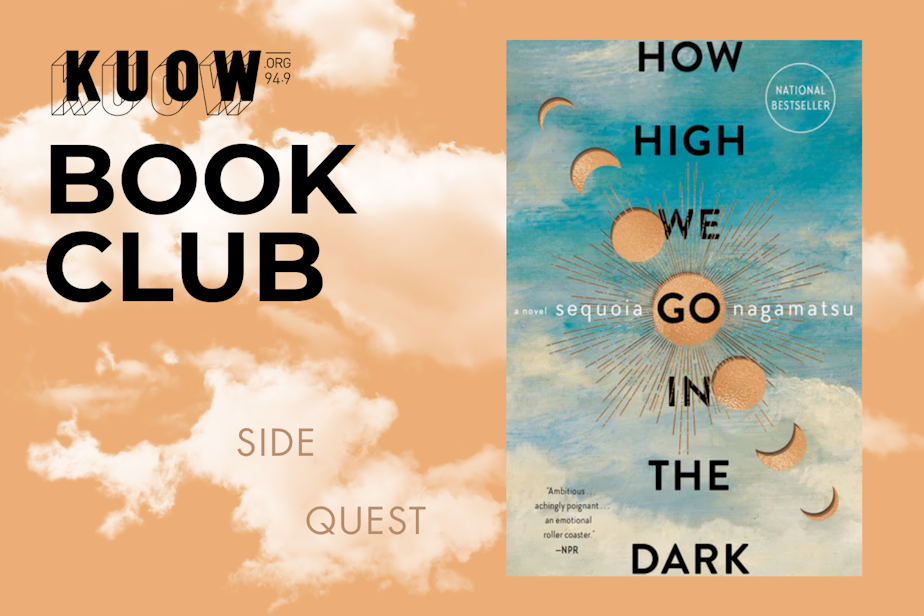How the National Enquirer inspired an ambitious work of speculative fiction

Sequoia Nagamatsu's 2022 speculative fiction hit "How High We Go in the Dark" may not be your typical summer read, but hear me out: The sunshine makes it easier to see the intricately woven silver linings throughout.
I revisited the anthology recently, after learning Nagamatsu is coming to Seattle this month to interview another author at Elliott Bay Book Company. I haven't stopped referencing "How High We Go in the Dark" since it came out — in fact, I just recommended it during a conversation with Clarion West Executive Director Marnee Chua — and I found it hit different this time around.
Perhaps that was thanks to the fact that the Covid-19 is further in the past now than it was the first time I read Nagamatsu's work.
"How High We Go in the Dark" begins with a pandemic. In this case, it stems from an ancient virus, locked in polar ice before climate change reveals the body of an infected child. The virus quickly wreaks havoc on humanity. The stories that follow reach years into the future, exploring the fallout for generations.
Yeah, it was a tough read in 2022.
Sponsored
"I probably wouldn't have written this book had I started it during Covid," Nagamatsu told me. "It probably would have been too close for me to actually start this project."
Luckily — for Nagamatsu, his bestselling work, and his readers — "How High We Go in the Dark" was nearly complete and headed to publication when the world shut down. Sure, it informed some of how the final collection appeared on the shelves, but Covid-19 was not the inspiration.
RELATED: Check out KUOW's arts podcast 'Meet Me Here'
Nagamatsu drew inspiration from things like his childhood love of Star Trek and "my grandmother's big stack of the National Enquirer" in their home in Hawaii.
"One of my early creative projects was creating a series of handmade National Enquirers with, like, crayons and markers," he said. "I would write news about, like, UFO sightings. And I was very aware, as a child, about the world in general. So, I would write articles about celebrity affairs, about how we can support prostitution in Waikiki. I was like 10 years old, and that was my happy place."
Sponsored
That revelation made a few things about "How High We Go in the Dark" click into place.
While the book has moments of levity and humor, it's not what I would call a lighthearted read. Nagamatsu takes high-concept science fiction elements, like a spaceship that can travel hundreds of lightyears while its human occupants are preserved in cryostasis, and adds timeless human relationships. There are family feuds, cheating partners, and a whole lot of parent-child dynamics that are easy to relate to even when the exact circumstances are not.
Marital issues stemming from one spouse working too much? A common theme, easy for readers to connect to. Marital issues stemming from one spouse working too much, in large part because a literal tear in the space-time continuum appears in their brain? Slightly less relatable!
Amid the seriousness of it all, though, there are hints at Nagamatsu's "super nerdy" interests.
Area 51, for example, is referenced in the anthology. Except in Nagamatsu's world, conspiracy theories about alien technology found there became an explanation for how scientists eventually figured out how to build the aforementioned spaceship.
Sponsored
RELATED: Subscribe to the KUOW Book Club newsletter here
Of course, that ship was influenced by the Starship Enterprise, too, even the sound of it.
"YouTube has these sound loops of the Starship Enterprise and another starship's engine rumbles or engine sounds looping for hours," Nagamatsu said. "So, sometimes I'll just like write to that kind hum, that mechanical hum."
If you're looking for engaging audio, you could also listen to "How High We Go in the Dark," as I did. The audiobook is beautifully narrated by a cast of more than a dozen voice actors. Their individual personalities and delivery make the many characters throughout the anthology shine and add another layer of immersion to Nagamatsu's work. The characters feel all the more real in the audiobook, making their triumphs and even the briefest joys more meaningful.
Seattleites will also have the opportunity to hear Nagamatsu in conversation with author Aram Mrjoian at Elliott Bay Book Company on July 15. They'll be talking about Mrjoian's debut novel, "Waterline," in which a family grapples with the death of a loved one.
Sponsored
You can hear even more from Nagamatsu on KUOW's "Meet Me Here," or by playing the interview embedded above.
RELATED: Summer book club continues with an imaginative collection of speculative fiction




